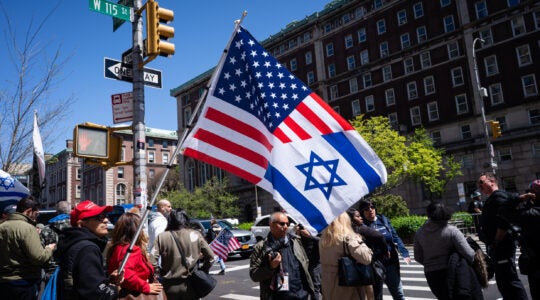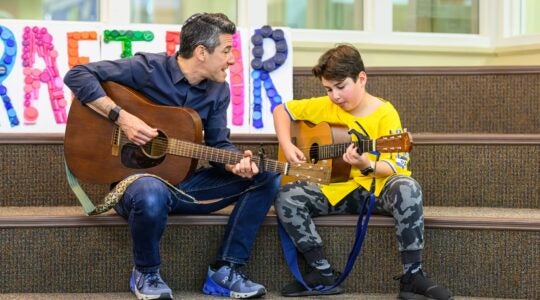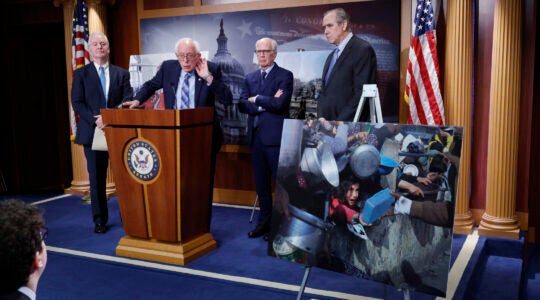NEW YORK (JTA) – Leah Siegel waited nearly three hours for her turn on stage at the Downtown Seder.In a pleated green dress and fire-engine red pumps, the singer-songwriter from Brooklyn downed two pieces of gefilte fish, a few glasses of wine and some matzah before performing a sultry cover of the Sam Cooke classic “A Change is Gonna Come.”Siegel finally took the stage just before 10 p.m., as the chicken dinner was being served. Like the traditional Passover meal on which it is modeled, guests at the Downtown Seder spent most of the evening March 28 drinking wine and foraging among the table scraps for sustenance. But the similarities ended there. Hardly anyone read from a standard Haggadah. Nor were there many traditional melodies, unless one counts Neil Sedaka performing “A Yiddishe Mama” on the piano. And the breaking of the afikomen, normally a seder highlight for the kids, was recast as mildly taboo with homoerotic overtones. Instead, a procession of minor Jewish celebrities read and sang and extrapolated on themes of freedom and redemption in a glass-windowed room at the Museum of Jewish Heritage overlooking New York Harbor.More than 350 years after the first Jews sailed through that waterway, 27 of their descendants – well, 26, since guitarist Dan Zanes isn’t Jewish – offered 400 guests a novel take on the Passover story. The operative word was “novel,” as most of the performances bore only a glancing connection to the story of the Exodus. Some, like Jay Michaelson’s highly charged spoken-word rendition of “Dayenu” or the beat-boxer Yuri Lane’s interpretation of the Ten Plagues, were directly inspired by sections of the Passover liturgy. Zanes did the Four Questions accompanied by his daughter Anna, who is Jewish.Other performers, like the Jewish rock supergroup the LeeVees, offered up more generic, we-feel-good-about-Passover fare. And some, like Siegel, just picked a favorite song that seemed vaguely appropriate. Passover, it appears, is more excuse than inspiration for the Downtown Seder which, in its auspicious venue at the tip of Manhattan, is really a celebration of the diverse flowering of Jewish culture that has taken root in America. When Sedaka crooned “Everything I am I owe to that lady,” he could well have been serenading the woman with the torch just outside the window.”America has offered the possibility of freedom in a deep way to peoples around the world,” architect Daniel Libeskind said, ruminating on the significance of the Haggadah’s Wise Child. Libeskind was followed to the stage by author Elisa Albert, who read from her collection “How This Night is Different.” Albert’s story, while inspired by Passover, had no obvious connection to her allotted passage concerning the Wicked Child – or, in downtown parlance, the “rebellious child.”The brainchild of New York music producer Michael Dorf, the Downtown Seder – now in its seventh iteration – began in 1987 at the Knitting Factory, a music club then located in the East Village. That year, Dorf showed a video of Martin Luther King Jr.’s “I Have A Dream” speech, which he thought was pretty original. The seder has since blossomed into a popular affair, with guests ponying up $150 to attend – and that’s just for the cheap seats. Dorf, who is involved with a number of Jewish cultural ventures, says he breaks even on the event, which despite its theatricality he considers authentic as well. “It obviously is a unique take on the seder concept, but it actually still fits all the requirements – we tell the story, we observe the rituals, we remind ourselves of what it was like to be slaves,” said Dorf, who plans to spend the real seder in Wisconsin with his parents. As the seder entered its fourth hour, guests began to filter out. After dinner – stuffed chicken breast, roasted potatoes and steamed carrots – there wasn’t much left on the musical menu. And for some that was just fine. “I found it to be more of a variety show than a telling of the Passover story,” said Brooklyn choreographer Dan Safer, who came seeking inspiration for his dance-theater project Haggadah, which he envisions as a dramatic recreation of the seder. Safer left with twinge of disappointment. But for the musicians at least, the simpler pleasures were sufficient: a free meal, a dramatic backdrop and abundant kosher wine. “I just performed on the same stage as Neil Sedaka,” Siegel said, returning to her seat. “Is there anything better for a Jew?”
JTA has documented Jewish history in real-time for over a century. Keep our journalism strong by joining us in supporting independent, award-winning reporting.





